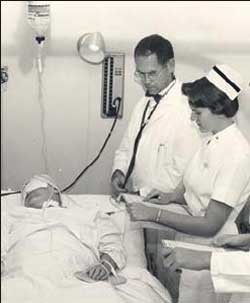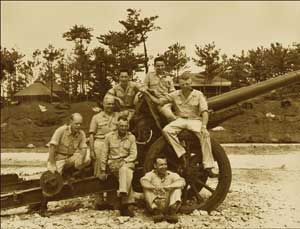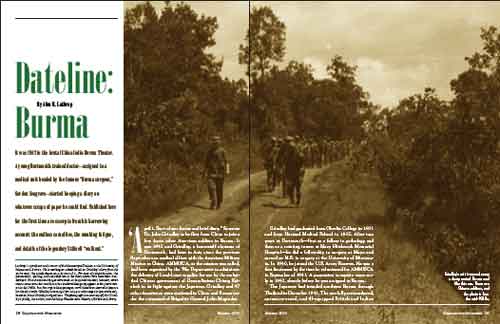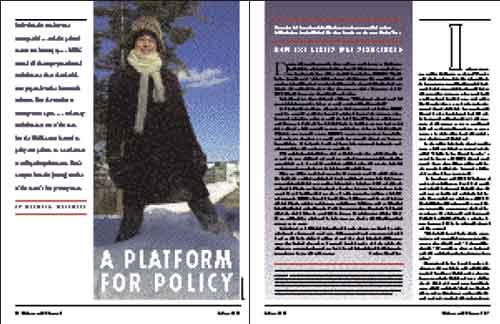Letter from Readers

We're always glad to hear from readers-whether it's someone weighing in with an opinion about an article in a past issue or someone wanting to be added to our mailing list to get future issues. We are happy to send Dartmouth Medicine-on a complimentary basis, to addresses within the United States-to anyone who is interested in the subjects that we cover. Both subscription requests and letters to the editor may be sent to: Editor, Dartmouth Medicine, One Medical Center Drive (HB 7070), Lebanon, NH 03756 or DartMed@Dartmouth.edu. Letters for publication may be edited for clarity, length, or appropriateness of the subject matter. |
"Something old, something new" appears to be the theme of this issue's feedback from readers. We got several letters about a pair of pieces set half a century ago: a news item about the 1955 establishment of the nation's first intensive care unit and a feature about a Dartmouth-trained surgeon who served in Burma during World War II. But a far more timely topic also caught readers' interest-a feature about the presidential candidates' health-policy proposals. Perhaps readers will find "something borrowed, something blue" to comment on in this issue...
Indelible impression
It was nice to see the picture of a
young Bill Mosenthal in the
Spring 2004 issue of Dartmouth
Medicine. While he is
remembered fondly by DMS
medical students from recent
decades for his anatomy lessons,
he also made an indelible impression
on a generation of surgical
house officers.
To this day, he epitomizes for me the complete surgical clinician- someone who really enjoyed what he did and who did it very well and with great integrity. He passed on his knowledge and technique both sternly and gently, conveying how serious one had to be to obtain personal satisfaction, not to mention good results. Both in the OR and on rounds, he became a lifelong role model for his residents.
My wife, Candace (who also did her residency training at Dartmouth), and I enjoy your publication very much. Each year, of course, we recognize fewer faces and read another familiar obituary, but we remain happy and proud that we spent some formative years at Dartmouth- Hitchcock. I have fond memories of many, many mentors there-but "Mose" stands tallest among them. He remains my unshifting paradigm for what a surgeon is.
I only wish that I could have beaten him on the squash court, maybe just once.
Edward Z. Walworth, M.D.
Housestaff '70-75
Lewiston, Maine
Impeccable judgment
This is a brief note to congratulate
you on the article in the
spring issue of Dartmouth
Medicine titled "Dateline: Burma."
Years ago I read about Dr.
Seagrave, but this diary account
was riveting-a testimony to the
human spirit and the willingness
to go to extreme lengths to help
the wounded, even in hopeless
and most trying conditions.
I also thoroughly enjoyed the piece on Bill "Mose" Mosenthal, who was indeed a special surgeon. He was one of the doctors I most respected during my residency at Hitchcock. Many people said that he was the finest abdominal surgeon north of Boston and had impeccable judgment. I knew him as a patient as well, for he and Jarrett Folley followed the progress of my colitis all the years of my training. He would have come to Concord to perform the definitive surgery in 1965 had the Clinic not passed a rule that none of its surgeons could perform surgery outside of Hanover. I shall never forget this very special professional from whom I learned so much.
Paul Lena, M.D.
DC '50, DMS '51, HS '54-59
Concord, N.H.

This photo of the late Bill Mosenthal -surgeon, anatomist, and creator of the nation's first intensive care unit- sent several readers back in time. |
Mayo mates
Thanks for sending me Dartmouth
Medicine. I was especially
interested in Alan Lathrop's
article "Dateline: Burma"
because I knew Dr. Grindlay
when we were both on the staff
of the Mayo Clinic in Rochester;
I heard he had died after moving
to Colorado.
I had talked with him about my own experiences in the European Theater. I went into the service as an orthopaedic surgeon and later went to Rochester to get board certified in radiology, because during my time in Nuremberg, after the war and before coming home, I concluded that the imaging sciences would be in the forefront of medicine- and I never left Rochester.
Colin B. Holman, M.D.
Dartmouth College '39
Mercer Island, Wash.
Granite State tie
I just finished reading "Dateline:
Burma" in your Spring 2004 issue.
That was indeed a harrowing
theater of war. I know, from
my own personal contacts over
the years with Mary Hitchcock
Memorial Hospital in Hanover
and Dartmouth-Hitchcock Medical
Center in Lebanon, how
very grateful I have been to have
doctors and nurses of high caliber
caring for me. In the same
way, Dr. Grindlay provided only
the best to our young soldiers.
On a more personal note, my uncle, General Frank Merrill, is pictured in the photograph on page 32 of that article. He is sitting on the far right. He was not mentioned in the article, as he was not part of the medical staff, but he was on that march with the rest of them. He was the leader of the famed "Merrill's Marauders." There was even a movie made about him titled Merrill's Marauders, with Jeff Chandler playing Uncle Frank. He led 3,000 men who had volunteered for a hazardous mission to take over a Japanese airfield in Myitkyina in northern Burma. Uncle Frank suffered two heart attacks while he was in Burma and was evacuated and told not to go back to his men. He went back each time.

A letter-writer reveals that Dartmouth-trained surgeon John Grindlay, on the far left, is joined in this WWII-era photo by someone else with a New Hampshire tie. |
After the war, he returned to New Hampshire and was appointed state highway commissioner by Governor Sherman Adams. The New Hampshire interstate system as we know it today was a result of my uncle's planning. The portion of I-89 from the New Hampshire-Vermont border to Concord was named after him; at the entrance ramp from Route 12A onto I-89 is a sign bearing his name.
In 1955, he attended the National Highway Commissioners convention and was elected president of the organization, quite an honor for New Hampshire. On the way home from that convention, everyone got sick from food poisoning. With his already weak heart, it was the final straw for him and he died.
His contributions to New Hampshire were great, and he was dearly loved by his Marauders as well.
Anne Merrill Bassette
Cornish Flat, N.H.
Alan Lathrop, the author of the article about the Dartmouth-trained Grindlay's service in Burma, adds a few more details about Merrill: "When I saw the photo [which was supplied to Dartmouth Medicine by Grindlay's family], I recognized Frank Merrill, who smoked a pipe constantly and is seen sitting on the wheel of the artillery piece. Merrill was the commander of 'Merrill's Marauders,' an American infantry outfit that won fame by capturing Myitkyina in August 1944. Merrill and his troops were totally used up by the end of the campaign . . . decimated mostly by disease, fatigue, and wounds. I once met a member of the outfit who was evacuated with scrub typhus and nearly died; he recovered and ended the war working on the docks in Shanghai well into 1946, when he at last was sent home. He had a good deal of love for Merrill and a lot of resentment for Stilwell, whom he (and other Marauders) blamed for keeping them in combat long after they were supposed to have been withdrawn."

This Spring 2004 feature, about a Dartmouth-trained surgeon who served in Burma, elicited several letters, including one about the photo at the top of this page. |
Important issue
I recently saw a patient-a retired
doctor-who had been
reading "A Platform for Policy"
[a feature in the Spring Dartmouth
Medicine on appearances
at DHMC by many of the
major presidential candidates]
while waiting for his appointment
with me to begin.
He commented, "This article is really good," but also remarked that none of the candidates addressed what he considers the most important health policy issue- malpractice reform.
Adam J. Sorscher, M.D.
Hanover, N.H.
Sorscher is an assistant professor of community and family medicine at DMS and practices at the Dartmouth- Hitchcock Clinic's Buck Road office in Hanover.
Policy perspectives
I thoroughly enjoyed Katrina
Mitchell's take on the presidential
candidates in the Spring issue
of Dartmouth Medicine.
The compare-and-contrast analysis
was striking.
I myself was able to attend all of the Health Policy Grand Rounds sessions except for the one with Senator Kerry; it figures- the one candidate I missed ends up as the Democrats' frontrunner!
I made some on-the-spot observations similar to the ones that were mentioned in the article; her summaries of Governor Dean's and Congressman Kucinich's visits were particularly insightful. And I especially liked the "Attendees' Reactions" and "Future Plans" segments at the end of the article-they offered a nice perspective.
I look forward to reading about future events in this series!
Peter Vinton, Jr.
Fairlee, Vt.
A matter of manipulation
As a practicing chiropractor at
the Dartmouth-Hitchcock Clinic
in Bedford, N.H., I read with
interest the article titled "Backing
a Landmark Study" in the
"Development" section of the
Winter 2003 Dartmouth Medicine.
At one point, the article
states, "But surgery is just one
way to treat low-back pain; there
are several nonsurgical alternatives,
including physical therapy,
osteopathic manipulation, and
pain medication."
I would like to point out that another alternative would be chiropractic manipulation; in fact, the vast majority of spinal manipulations in this country are performed by chiropractors. Actually, a more accurate term might be "spinal manipulation" instead of either chiropractic or osteopathic manipulation.

There was snow on the ground when Dartmouth hosted most of the leading presidential candidates at a series called Health Policy Grand Rounds. It's summer now, but-as two letters here indicate-the series is still sparking discussion. |
While there are several different techniques that may be utilized in spinal manipulation, it is unlikely that the joint complex would know whether the manipulation is osteopathic or chiropractic. To my knowledge, there has never been a study to determine which manipulative technique works the best for which types of back pain. Perhaps this is fertile ground for future research.
For now, however, I think that using the term "osteopathic manipulation" tends to suggest that one form of spinal manipulation is better than another or that the techniques are substantially different, and it may reinforce unnecessary turf battles.
I can assure you that I treat low-back pain every day and have some degree of success by utilizing the spinal manipulation techniques that I learned in chiropractic school. I am quite sure the techniques that are taught in osteopathic schools may also be successful. It is entirely likely that the techniques and the results are similar.
Arthur I. Slotnick, D.C.
Bedford, N.H.

Be sure to tell us when you move! If your address changes and you want to keep getting Dartmouth Medicine, just tear off the address panel from the back of a recent issue, write your new address next to the old one, and mail it to: Dartmouth Medicine, One Medical Center Drive (HB 7070), Lebanon, NH 03756. It helps us greatly-since our mailing list is drawn from six separate databases-if you send the actual cover or a copy of it. If that's not possible, please include both your old and new addresses. Note, too, that if you receive more than one copy of the magazine, it's because of those six databases (which are in different formats, so they can't be automatically "de-duped"). We're happy to eliminate duplications, but it's a help to have the address panel on all the copies you get, not just the one(s) you'd like deleted. |
Human insight
I would very much appreciate
having Dartmouth Medicine
sent to my home. I was formerly
the nurse coordinator for the
Spina Bifida Clinic at DHMC
and have always enjoyed reading
your publication. I have found it
to be very informative and I believe that you do a wonderful job
writing about both the clinical
and the human aspects of the
practice of medicine.
Thank you.
Ann Heimarck
Quechee, Vt.
Reader request
I would like to be put on your
mailing list to receive a complimentary
subscription to Dartmouth
Medicine.
A family member is currently receiving treatment at the Norris Cotton Cancer Center. I visited the Cancer Center in January and have your Fall 2003 issue and would like to begin with your Winter 2003 issue.
I look forward to reading your very interesting and informative magazine.
Barbara Okarski
Daytona Beach, Fla.
Internal organ
Sitting in the waiting rooms at
DHMC this past winter, I became
addicted to your delightful
magazine. I never would have
believed that a house organ
could be this interesting.
Now that my doctors' appointments are over, I'm hoping that you will put me on your mailing list so I can continue reading Dartmouth Medicine.
Many thanks.
Phyllis Wood
South Woodstock, Vt.
We're happy to add to our mailing list anyone interested in the subjects we cover-that's an addiction that even a medical magazine doesn't mind promoting!
If you would like to offer any feedback about this article, we would welcome getting your comments at DartMed@Dartmouth.edu.
